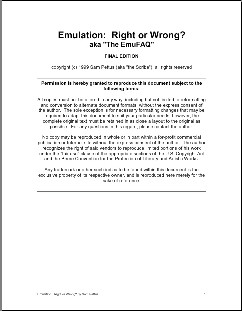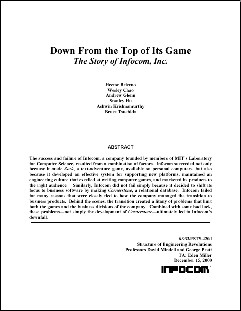Book Roundup
by Schnapple
In the world and realm of PC and console gaming, there is a surprising and
rising number of books and things to read. I'm not referring to websites with
content and articles, nor am I referring to magazines. What I mean are the
actual, old army books. I'm not referring to strategy guides or hint books, I'm
talking about works of nonfiction that are about gaming, not how to beat
a game. Of course, I guess I also apply this term loosely, as a couple of the
entries below aren't "really" books - more like lengthy, bookish
documents - but they read better printed out while you're eating (my favorite
way) than on a computer screen. As I'll point out in a minute, a couple of years
ago we didn't have too many options when it came to books on computer and video
games, but we're well on our way to having a shelf devoted to our favorite pastime.
 Phoenix:
The Fall and Rise of Videogames, Second Edition
Phoenix:
The Fall and Rise of Videogames, Second Edition
by Leonard Herman
Until fairly recently, this was it as far as books on video games was
concerned. What I have pictured here is the second edition's cover. The book is
self-published by the author through his own company, Rolenta
Press, so don't look for it in you local Barnes & Noble. If you click on
the link to the left, you will go to amazon.com's page on it, which lists the
book as out of print. Sure enough, the Rolenta website lists the book as out of
print, with a third edition in the works for release in 2001. I get the
impression that, while the first edition's 1000 copies didn't sell out, the 2500
copies of the second edition (of which I was lucky enough to get a copy of a
while back) have. At any rate, if you have a chance to get a hold of a copy of
this book, do it. It is a thorough history of video games, dating the
industry's inception as 1972. Plus, it has all the hallmarks of self publishing
- it smells funny and has font choices that would never get past a publishing
house. It's a fascinating read. However, the pictures of the consoles (an
addition for the second edition) are low quality (though better than nothing),
and the structure needs work. Each chapter is one year which is great, but too
often one company's story gets cut short to be continued later in the next
chapter. Worse yet, the writing simply needs work - it's dry and wooden in most
places. Having said all of that, this is still a good book, and is the
sought-after Bible for the gaming industry.
 The
First Quarter: A 25-Year History of Video Games
The
First Quarter: A 25-Year History of Video Games
by Steven L. Kent
Okay, I haven't actually read this one yet, but it's been getting great reviews
and I plan on getting it soon. As one reviewer put it, Phoenix is the
textbook of the game industry, and The First Quarter is the unauthorized
biography. Kent's book differs in that it is longer (by about 200 pages at close
to 550) and features several interviews with game industry pundits. I'm not sure
if it is self published, but it is available exclusively through amazon.com
(Kent had doubts that it would be carried by traditional retail channels). I'm
also not sure how he related to Next Generation magazine, but Kent used
to be featured in that magazine. More on this book after I read it.
 Game
Over - Press Start To Continue: The Making of Mario
Game
Over - Press Start To Continue: The Making of Mario
by David Sheff
I haven't read this one personally either, but it bears mentioning mainly due to
the fact that it basically serves as a book on Nintendo in the 1980's. It serves
partly as a book on how Nintendo revived the game industry and how they used
their business tactics, and partly a book on the effective tactics and
manipulative methods on both children and developers gave them the 90% market
share they enjoyed at the close of that decade. This book mostly concerns itself
with the NES and a bit on the SNES, but it concludes at the launch of the N64.
It would be interesting to see a new edition (the one in the green cover is an
"unofficial" second edition) that covers the N64's rough ride, but at
this point I'd be more interested in seeing how the Game Cube will fare. More on
this one as well after I read it.
 Emulation:
Right or Wrong? (aka The EmuFAQ)
Emulation:
Right or Wrong? (aka The EmuFAQ)
by Sam Pettus
Now we get into the really good stuff - ironic, since this one is free and
all. Pettus is a man whose computer experience started when his church purchased
him a Commodore 64 to help organize church records, and he nearly wound up in
jail as a member of a piracy group. In the late 90's, he started SNESList,
a listing of which SNES ROMs would play best on which emulators, to save people
some time. He got a nasty letter from Nintendo telling him to stop making the
list, and that they did not waive the right to sue him. Pettus did as he was
told (like most of us would) and then started wondering if his list - which did
not give away ROMs or info on their acquisition - did in fact infringe on any
copyrights of Nintendo. He started working on an Emulation FAQ, since although
console emulation was a relatively new thing, it bears legal resemblance to
other issues computing and video game history. Though it was originally conceived
as a document on emulation, it evolved from what was probably a simple list of
emulation related questions and answers into a 300+ page document approaching
the writing quality level of a legal textbook. It extends its reach beyond
emulation into the realm of video games over the years and even the history of
computing itself. It's a fascinating read, and Pettus has some God-given talents
(his own words) in the realm of writing. This is one I'd recommend printing out
(yeah yeah, I know it's long) and reading on your own time.
When Pettus announced this work prior to its release, the emulation community
was stoked, since they figured the document would legitimize their efforts and
tell them they were doing nothing wrong. The first part, however, stated that
not everything the community was doing was in the right - this caused some
outrage, understandably. When the first part came out, UltraHLE had not been
released. Before the last part came out (it took ~2 years) bleem! had
been released and had won in its efforts in court with Sony. This is a
fascinating work.
The EmuFAQ is hosted on many different websites, usually in HTML format. The
main one is at the Penny-Arcade wannabe Overclocked,
whose author even illustrated it. I, however, have my own PDF version for
download. I constructed it from the HTML version and took the liberty of
deleting the OC comics and the Backstreet Boys quote (shudder). Sure,
this violates the agreement, but I made this version for my own use originally.
Download it by clicking on the page above or clicking here.
 Down
From the Top of Its Game
Down
From the Top of Its Game
by Hector Briceno, et al.
Written as a term paper for an Engineering class, this paper
is a fascinating report on Infocom, the 1980's computer game company whose
titles include the Zork trilogy, Leather Goddesses of Phobos and Trinity,
all text adventures. While a casual observer might simply infer (as I did) that
they couldn't "hang" when computer games turned to graphics, and
someone who had done some reading might hear that they lost their shirts when
they tried to create a business database called Cornerstone, there was a
lot more going on. As it turns out, the company was founded with the intention
of becoming a business software developer - the games were just to be a revenue
generator until they could get on their feet. The founders wanted to hang with
their MIT alums who had founded Lotus (then a powerful company with 1-2-3),
and were embarrassed that their products were games (though I am not sure how it
is seen today, at one point the game industry was the "black sheep" of
the software industry). Inferior products, a failure to innovate and
bean-counter mentalities killed Infocom. The authors even went so far as to
acquire internal Infocom documents and interview former members to write this
paper. A fascinating read. Click on the page or here
to download.
More later, including a review of Dave Grossman's Stop
Teaching Our Kids To Kill.
 Phoenix:
The Fall and Rise of Videogames, Second Edition
Phoenix:
The Fall and Rise of Videogames, Second Edition The
First Quarter: A 25-Year History of Video Games
The
First Quarter: A 25-Year History of Video Games Game
Over - Press Start To Continue: The Making of Mario
Game
Over - Press Start To Continue: The Making of Mario